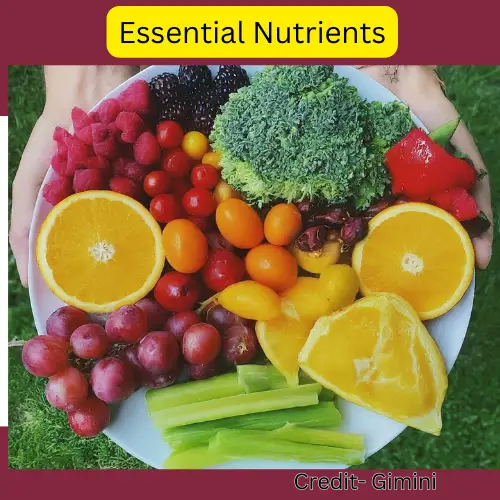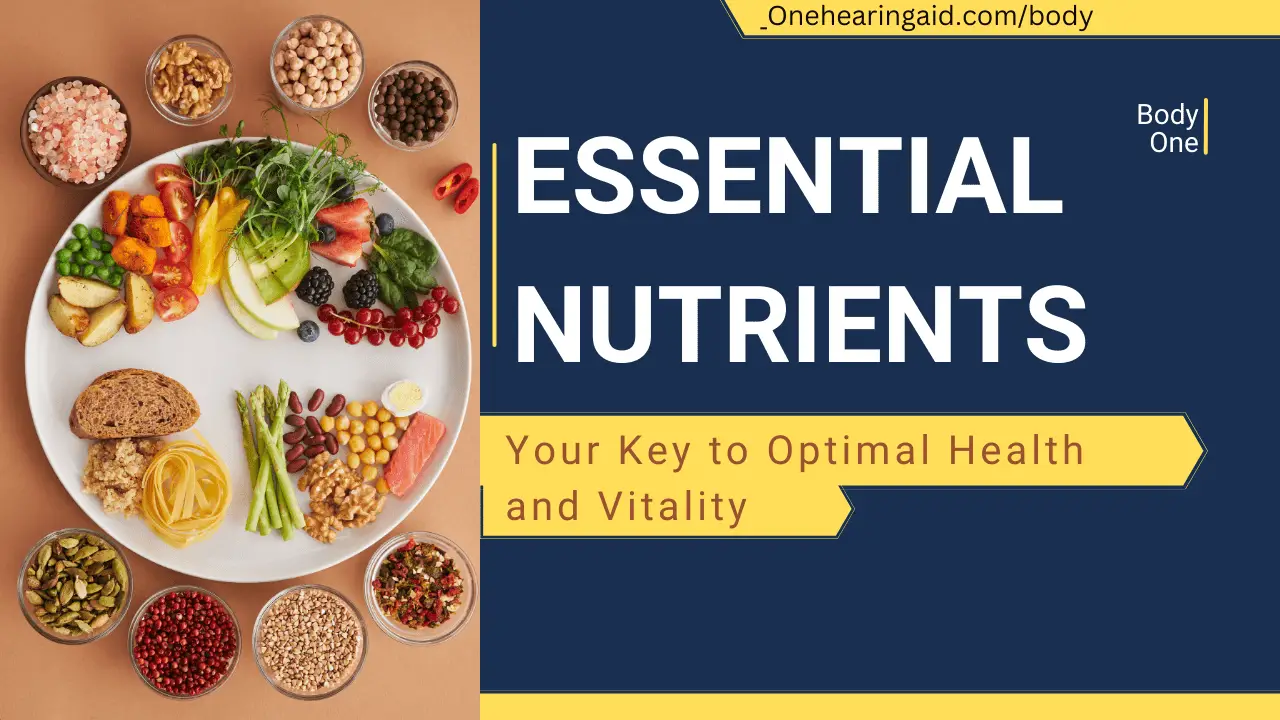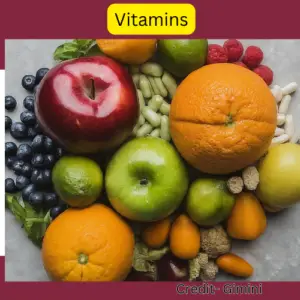“Essential Nutrients: Unlock the secret to optimal health and vitality with our comprehensive guide. Learn how incorporating these vital elements into your diet can transform your overall well-being and energy levels. From understanding the importance of essential nutrients to identifying key sources and recommended intake levels, this guide has everything you need to take control of your health journey. Say goodbye to fatigue and hello to a vibrant, energetic lifestyle by prioritizing your body’s essential nutrient needs. Don’t miss out on this essential knowledge – dive into our guide now and start your journey to a healthier, happier you!”

Introduction
Understanding essential nutrients is crucial for anyone who wants to achieve optimal health and well-being. This guide will provide you with all the information you need to know about the six essential nutrients: carbohydrates, proteins, fats, vitamins, minerals, and water.
Understanding Essential Nutrients
What are Essential Nutrients?
Essential nutrients are substances that your body cannot produce on its own and must obtain from food. They are vital for a variety of functions, including growth, development, repair, and maintenance of tissues, and regulation of bodily processes.
Importance of Essential Nutrients for Overall Health
Essential nutrients play a critical role in maintaining good health. They can help to:
- Boost your immune system
- Reduce your risk of chronic diseases
- Improve your energy levels
- Enhance your mood
- Promote healthy skin, hair, and nails
- And much more!
Macronutrients
Macronutrients are nutrients that your body needs in large amounts. They provide your body with energy and the building blocks for tissues. The three main macronutrients are:
- Carbohydrates: Carbohydrates are your body’s primary source of energy. They are found in a variety of foods, including fruits, vegetables, grains, and beans.

Carbohydrates - Proteins: Proteins are essential for building and repairing tissues. They are found in a variety of foods, including meat, poultry, fish, eggs, dairy products, beans, and nuts.
- Fats: Fats provide your body with energy, insulation, and protection. They are also essential for the absorption of certain vitamins. There are two main types of fats: healthy fats and unhealthy fats. Healthy fats are found in foods such as avocados, nuts, seeds, and olive oil. Unhealthy fats are found in processed foods, fried foods, and fatty meats.
Micronutrients
Micronutrients are nutrients that your body needs in small amounts. They play a variety of important roles in your body, including:
- Vitamins: Vitamins help your body with a variety of functions, including energy production, cell growth, and immunity. There are 13 essential vitamins, which can be further categorized as fat-soluble (A, D, E, and K) and water-soluble (B-complex and C).
- Minerals: Minerals help your body with a variety of functions, including building strong bones and teeth, regulating blood pressure, and transmitting nerve impulses. There are 20 essential minerals, which can be further categorized as major minerals (calcium, magnesium, potassium) and trace minerals (iron, zinc, selenium).
Water
Water isn’t just a beverage; it’s the most crucial nutrient your body needs. It makes up around 60% of your body weight and plays a vital role in every single bodily function.
Importance of Hydration for Optimal Health:
- Regulates body temperature: Sweating releases excess heat, preventing overheating.
- Transports nutrients and oxygen: Delivers essential elements to cells and removes waste products.
- Lubricates joints and protects tissues: Cushions joints and acts as a shock absorber for organs.
- Aids digestion: Helps break down food and move it through the digestive system.
- Boosts brain function: Dehydration can lead to fatigue, headaches, and difficulty concentrating.
- Maintains healthy skin and hair: Keeps skin hydrated and supple, and promotes healthy hair growth.
- Prevents kidney stones: Dilutes urine and reduces the risk of stone formation.
- Regulates blood pressure: Adequate hydration helps maintain healthy blood pressure levels.
Water as an Essential Nutrient:
Unlike other nutrients, your body doesn’t store water efficiently. This means consistent water intake throughout the day is crucial. The exact amount of water you need depends on various factors like age, weight, activity level, climate, and overall health.
General daily water recommendations:
- Adults: 2.7 liters (91 ounces) for women and 3.7 liters (125 ounces) for men.
- Children: Varies based on age and activity level.
Individualized requirements:
- Increased activity: Athletes and individuals who sweat heavily need to compensate with extra fluids.
- Hot climates: Increased sweating necessitates higher water intake.
- Health conditions: Some medical conditions may require adjustments to water intake.
Daily Water Requirements and Hydration Tips:
- Listen to your thirst: This is a good indicator, but don’t wait until you’re dehydrated.
- Carry a reusable water bottle: Keep it handy and refill regularly.
- Set reminders: Apps or alarms can help you stay on track.
- Infuse your water: Add fruits, vegetables, or herbs for flavor variety.
- Choose water over sugary drinks: Limit soda, juice, and other high-sugar beverages.
- Eat water-rich foods: Fruits, vegetables, and soups contribute to hydration.
- Monitor your urine: Pale yellow urine indicates good hydration, while dark yellow or amber urine suggests you need more water.
Nutrient Deficiencies
While a balanced diet aims to provide all the essential nutrients your body needs, deficiencies can occur due to various factors. Let’s delve into some common deficiencies, their signs, and strategies to prevent and manage them.
Common Nutrient Deficiencies:
- Iron: Crucial for red blood cell production. Deficiency: Fatigue, weakness, pale skin, shortness of breath, cold intolerance. Sources: Red meat, poultry, beans, lentils, fortified cereals.
- Vitamin D: Essential for bone health and immune function. Deficiency: Bone pain, fatigue, muscle weakness, increased susceptibility to infections. Sources: Sunlight, fatty fish, mushrooms, fortified milk and cereals.
- Vitamin B12: Vital for nervous system function and red blood cell production. Deficiency: Fatigue, weakness, tingling or numbness in hands and feet, anemia. Sources: Animal products, fortified cereals and milks.
- Iodine: Important for thyroid function. Deficiency: Fatigue, weight gain, cold intolerance, hair loss, goiter (enlarged thyroid gland). Sources: Iodized salt, seafood, seaweed.
- Calcium: Builds strong bones and teeth. Deficiency: Osteoporosis, weak bones, muscle cramps. Sources: Dairy products, leafy greens, fortified foods.
- Magnesium: Supports muscle and nerve function, energy production. Deficiency: Muscle cramps, fatigue, high blood pressure, anxiety. Sources: Nuts, seeds, legumes, leafy greens, dark chocolate.
Signs and Symptoms:
Deficiency symptoms can vary depending on the nutrient and severity. General signs include fatigue, weakness, muscle cramps, hair loss, skin problems, and difficulty concentrating. However, a healthcare professional can provide a more accurate diagnosis through blood tests and other assessments.
Prevention and Management Strategies:
- Balanced diet: Focus on whole, unprocessed foods from various food groups for a spectrum of nutrients.
- Food fortification: Consider fortified foods, especially if dietary sources are limited.
- Supplementation: Consult your doctor for personalized recommendations regarding supplements. Remember, they aren’t replacements for a balanced diet.
- Lifestyle changes: Regular exercise promotes nutrient absorption and utilization.
- Addressing underlying conditions: Certain medical conditions can hinder nutrient absorption, requiring specialized interventions.
Dietary Guidelines for Essential Nutrients
Choosing wholesome foods for optimal health can feel overwhelming with various dietary guidelines and nutrient recommendations floating around. Let’s explore key concepts like RDAs, DRIs, and how to build a balanced diet rich in essential nutrients.
Understanding Dietary Guidelines:
- Recommended Daily Allowances (RDAs): This refers to the average daily intake level sufficient for nearly all healthy individuals to meet their nutrient needs. However, individual requirements may vary.
- Dietary Reference Intakes (DRIs): This broader framework encompasses RDAs along with other reference values like Estimated Average Requirements (EARs) and Tolerable Upper Intake Levels (ULs), providing a more nuanced understanding of nutrient needs.
Building a Balanced Diet:
While specific recommendations might differ based on age, gender, and health conditions, some general principles help create a balanced diet:
- Variety is key: Include fruits, vegetables, whole grains, lean protein sources, and healthy fats in your diet. Aim for at least 5 servings of fruits and vegetables daily.
- Portion control: Be mindful of serving sizes to avoid overconsumption of any particular food group.
- Limit processed foods: These are often high in unhealthy fats, sugars, and sodium, lacking essential nutrients.
- Choose healthy fats: Prioritize unsaturated fats like those found in avocado, nuts, and olive oil. Limit saturated and trans fats.
- Cook more at home: This allows greater control over ingredients and portion sizes.
- Read food labels: Pay attention to serving sizes, nutrient content, and ingredients list. Opt for foods lower in added sugars, saturated and trans fats, and sodium.
- Stay hydrated: Water is essential for overall health. Aim for at least 8 glasses of water daily, adjusting based on your activity level and climate.
Additional Resources:
- Dietary Guidelines for Americans: https://www.myplate.gov/
- World Health Organization: Healthy Diet: https://www.who.int/news-room/fact-sheets/detail/healthy-diet
- National Institutes of Health: Office of Dietary Supplements: https://ods.od.nih.gov/
Supplementation
While a balanced diet should ideally provide all the essential nutrients your body needs, supplementation might be considered in certain situations. Let’s explore when supplementation might be necessary, different types of supplements available, and key factors to consider before taking them.
When is Supplementation Necessary?
Supplementation isn’t a magic bullet and shouldn’t replace a nutritious diet. However, it may be beneficial in specific cases:
- Diagnosed nutrient deficiencies: If blood tests confirm a deficiency, your doctor might recommend specific supplements to address it.
- Limited dietary sources: Individuals with restricted diets due to allergies, sensitivities, or specific medical conditions may need supplements to compensate for limited nutrient intake.
- Certain life stages: Pregnant or breastfeeding women might require additional folic acid, iron, or calcium. Some older adults may benefit from vitamin D3 and B12 supplements.
- Digestive issues: Individuals with malabsorption conditions like Crohn’s disease might need support with nutrient absorption through supplements.
Remember: Always consult your doctor before starting any supplements, especially if you have pre-existing health conditions or take medications. They can assess your individual needs and recommend appropriate supplements if necessary.
Types of Nutritional Supplements:
- Multivitamins: Contain a combination of vitamins and minerals intended to fill common gaps in a diet.
- Single-nutrient supplements: Focus on providing a specific nutrient, like vitamin D, iron, or calcium.
- Herbal supplements: Derived from plants and claimed to have various health benefits. However, their effectiveness and safety can vary greatly.
Considerations Before Supplementing:
- Do you have a documented deficiency? Don’t assume you need a supplement without consulting your doctor.
- Quality and safety: Choose reputable brands with third-party certifications for quality and purity.
- Potential interactions: Supplements can interact with medications, so inform your doctor of any supplements you’re considering.
- Dosage and side effects: Follow recommended dosages and be aware of potential side effects.
- Not a quick fix: Supplements are not a shortcut to a healthy lifestyle. Focus on building a balanced diet first.
Balancing Essential Nutrients
Balancing essential nutrients in your diet is crucial for optimal health and well-being. Let’s dive deeper into creating balanced meals, meeting daily needs, and maintaining a healthy lifestyle for vibrant living.
Creating Balanced Meals:
- Follow the MyPlate model: Divide your plate into thirds:
- One-third fruits: Choose different colors for a variety of vitamins, minerals, and fiber.
- One-third vegetables: Include both starchy and non-starchy options for a comprehensive nutrient profile.
- One-third protein: Opt for lean protein sources like fish, poultry, beans, or lentils for muscle building and repair.
- Whole grains over refined: Whole grains offer complex carbohydrates for sustained energy.
- Healthy fats are essential: Include unsaturated fats from avocado, nuts, and olive oil for heart health.
- Plan and prep: Planning meals and snacks helps ensure variety and prevents unhealthy choices.
- Read food labels: Be mindful of serving sizes, nutrients, and ingredients.
Tips for Meeting Daily Nutritional Needs:
- Personalize your plate: Consider your activity level, age, and any dietary restrictions.
- Listen to your body: Savor your food and stop when you’re comfortably full.
- Stay hydrated: Drink plenty of water throughout the day.
- Cook more at home: This gives you greater control over ingredients and portions.
- Variety is key: Explore different cultures and cuisines for rich culinary experiences and wider nutrient exposure.
Strategies for Maintaining Optimal Health:
- Regular exercise: Physical activity enhances nutrient absorption and utilization.
- Manage stress: Chronic stress can disrupt nutrient balance.
- Prioritize sleep: Adequate sleep is essential for cell repair and regeneration, relying on proper nutrient intake.
- Regular checkups: Consult your doctor for personalized guidance and to monitor your overall health.
Conclusion
This journey through the world of essential nutrients has hopefully revealed their incredible influence on every aspect of your life. From the energy they supply to the intricate reactions they spark in your body, understanding their significance empowers you to make informed choices for a thriving life.
Remember, you don’t need to be perfect. Celebrate the small victories, the mindful choices you make each day, and the gradual shift towards a balanced diet filled with nutrient-rich wonders. This guide serves as a starting point, a map to ignite your exploration and equip you with the knowledge to navigate the world of nutrition with confidence.
Embrace the diverse culinary tapestry around you, experiment with new flavors, and prioritize whole foods that nourish your body and soul. Remember, a balanced approach is key. Don’t fall prey to the allure of quick fixes or fad diets. Instead, focus on consistency, making sustainable changes that fit your lifestyle and preferences.
And when in doubt, don’t hesitate to seek professional guidance. A registered dietitian or nutritionist can tailor a plan to your unique needs and help you navigate any hurdles along the way.
So, embark on this journey with enthusiasm, celebrate the progress you make, and remember, nourishing your body with essential nutrients is an investment in your overall well-being, paving the way for a vibrant and healthy life.
FAQ’s
1. What’s the biggest myth about essential nutrients?
Myth: I can get all the nutrients I need from supplements.
Reality: While supplements can fill specific gaps, a balanced diet should be your primary source of essential nutrients. Whole foods offer a complex mix of vitamins, minerals, fiber, and other beneficial compounds that supplements can’t replicate.
2. Are there “superfoods” packed with all the essential nutrients?
Answer: No single food contains all the nutrients your body needs. Focus on diversifying your diet across different food groups like fruits, vegetables, whole grains, and lean protein sources for a well-rounded nutrient profile.
3. I’m vegan/vegetarian, can I still get enough essential nutrients?
Answer: Absolutely! Careful planning and incorporating protein sources like beans, lentils, tofu, and nuts, along with fortified foods, can ensure you meet your nutrient needs. Consult a registered dietitian for personalized guidance.
4. What are some sneaky signs I might have a nutrient deficiency?
Answer: Fatigue, weakness, hair loss, brittle nails, difficulty concentrating, muscle cramps, and frequent infections can be indicators. However, a doctor’s diagnosis is crucial for confirmation and proper management.
5. Are organic foods always more nutritious?
Answer: Not necessarily. While organic farming avoids certain chemicals, both organic and conventionally grown produce can be part of a healthy diet. Focus on variety and choosing fruits and vegetables you enjoy to encourage consistent intake.
6. Is it okay to skip meals if I eat healthy snacks?
Answer: Regular meals are essential for nutrient absorption and maintaining stable blood sugar levels. Snacks can complement your diet, but shouldn’t replace full meals.
7. What are some practical tips for building balanced meals?
Answer: Follow the MyPlate model, use whole grains over refined, incorporate healthy fats, and prioritize lean protein sources. Plan your meals, cook more at home, and read food labels for mindful choices.
8. Can I have too much of a good thing with certain nutrients?
Answer: Yes, overconsuming even essential nutrients can be harmful. Consult your doctor before starting high-dose supplements and prioritize a balanced diet to avoid exceeding recommended intakes.
9. I don’t enjoy cooking, are there still healthy options for me?
Answer: Absolutely! Explore quick and easy recipes, meal prep options, or consider healthy delivery services. Remember, small changes like adding fruits and vegetables to pre-made meals can make a difference.
10. How can I stay motivated on my healthy eating journey?
Answer: Set realistic goals, celebrate small victories, find an accountability partner, and explore delicious recipes. Remember, it’s a journey, not a sprint. Focus on progress and the positive impact on your health and well-being.
Read More For Workout Routine:
Workout Routine: Transform Your Fitness Journey with this Beginner’s Guide





4 thoughts on “Essential Nutrients: Your Key to Optimal Health and Vitality”